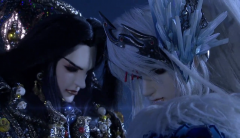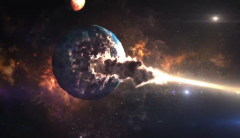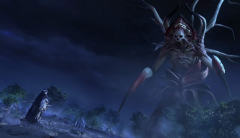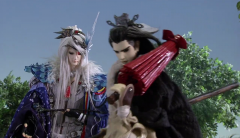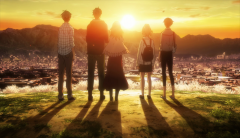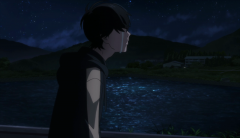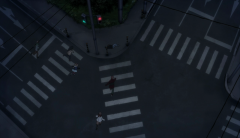As expected, Thunderbolt Fantasy ends with a blast. While it does close the arc nicely, I can’t help but feel slightly underwhelmed by the climax. This final episode ties up two main storylines: Gui Niao challenged Ming Tian Hai in swordfight, and Shang Bu Huan faced the fearsome demon god Yao Tu Li, and provides us a nice little epilogue in the end. Well, not the end exactly because it was announced that Thunderbolt Fantasy will have a second season. Way to go anime industry. The world needs more puppet shows. I already feel blessed with the news myself.
Back to where we left of last episode, Gui Niao decides to ridicule Ming Tian Hai on what the antagonist truly proud of: his swordfight. Turns out that Gui Niao is an overpowered badass who not only good at deceiving people, but also a master swordsman. To put it more coherently, because he’s so good at sword fighting he eventually gets bored and becomes a master thief instead. This of course doesn’t bode well for Ming Tian Hai. I died laughing at the ridiculous of it all, so was the guy. Literally. The battle is so over the top that it shook the world, apparently. At this point, Reigan’s voice on the other show keeps popping in my head: These guys are children who failed to grow up. The way Ming Tian Hai felt crushed because he is defeated by Gui Niao, that he has to break down the sword, let the world destroyed, and died laughing. These actions are not unlike those kids who their favorite toys taken away from them, so they just make a nonsensical scene. But Gui Niao actually falls for that. He expects Ming Tian Hai submitted himself as loser, so when things don’t go as plan he loses his cool for the very first time. Oh pride, the most serious sin of them all.
I love to point out how important the swords represent in this series. For villains like Mie Tian Hai or the Screaming Phoenix Killer Sha Wu Sheng, the swords represent power and destruction. Mie Tian Hai seeks the ultimate power in the legendary sword, while the Phoenix Killer mercilessly kills everyone stand in his path. Our two mains don’t see it this way. Gui Niao realizes that using the swords excessively would eventually lead him to the path of killing and villainy, which he despises. Shang Bu Huan witnesses many people misuse the swords, so instead he collected them in order to dispose them altogether. The sword he eventually carries around is a piece of wood that he painted silver, same as Gui Niao with his pipe-sword. The legendary sword, on the other hand, ends up being destroyed meaninglessly. That irony plays very well with both the tone and the theme of Thunderbolt Fantasy. The show never intends to be a straight wuxia show, so it only makes sense that Gen Urobuchi flirts with all the tired cliché and makes something new of it. Furthermore, In the world of Thunderbolt Fantasy, swords are ultimately just a tool for human, as Shang Bu Huan puts it: “Whether it cuts something or protect someone just depends on who uses it.” It’s nothing deep I know, but it’s thematic relevance.
Shang Bu Huan steps up for the climax against Yao Tu Li, the female demon god. It’s interesting that the only two demon gods we see in this series are female. It should make sense though because like a notion of life and death is meaningless among demons, the same could be said for their gender. The way they reproduce is more of the process of replication, right? It is then revealed that not only Shang Bu Huan has a legendary sword for himself, he has 36 of them. When the right time comes he would choose the checklist of his swords’ inventory like you’d choose a weapon on your crappy online games. By the way 36 is not some random number, that number (and its multiplication) have been widely used in traditional Chinese literature/text (36 Stratagems; The Monkey King knows 72 transformations, there are 108 outlaws in Water Margin) and I’m again amazed that Gen Urobuchi takes note of that. While this fight is amazing, I can’t help but feel that all this resolution is way too quick, and thus too easy, for our main characters, especially since last week they built the stake up really high. In the end, both Gui Niao and Shang Bu Huan are just too overpowered that all the suspense is gone through the back door.
But in the end, I had a lot fun watching Thunderbolt Fantasy, considered that I know nothing about its existence up until the first episode came out. Now 3 months later it’s one of the most entertaining anime I’ve seen this year. Well, I will tell you in details once the final review comes up. But definitely you will see me talking about this show again when the second season is aired.

